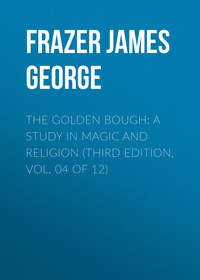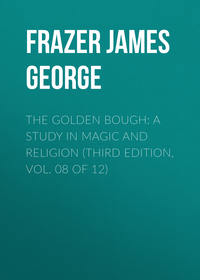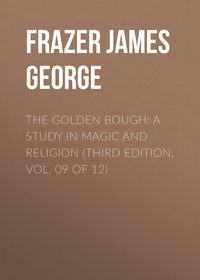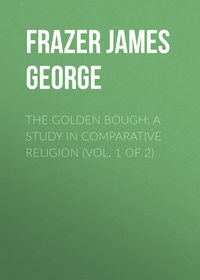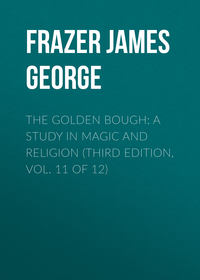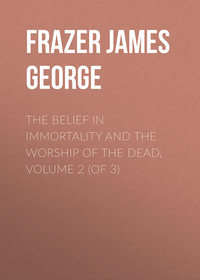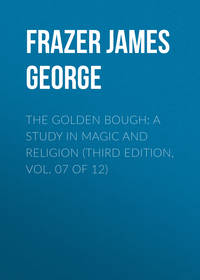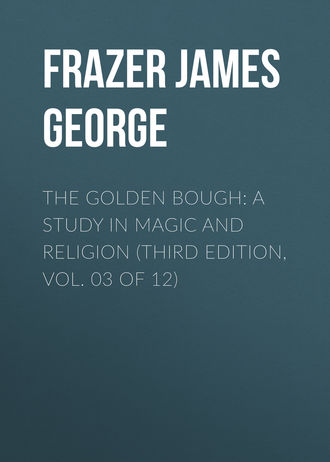 полная версия
полная версияThe Golden Bough: A Study in Magic and Religion (Third Edition, Vol. 03 of 12)

James George Frazer
The Golden Bough: A Study in Magic and Religion (Third Edition, Vol. 03 of 12)
Preface
The term Taboo is one of the very few words which the English language has borrowed from the speech of savages. In the Polynesian tongue, from which we have adopted it, the word designates a remarkable system which has deeply influenced the religious, social, and political life of the Oceanic islanders, both Polynesians and Melanesians, particularly by inculcating a superstitious veneration for the persons of nobles and the rights of private property. When about the year 1886 my ever-lamented friend William Robertson Smith asked me to write an article on Taboo for the Ninth Edition of the Encyclopaedia Britannica, I shared what I believe to have been at the time the current view of anthropologists, that the institution in question was confined to the brown and black races of the Pacific. But an attentive study of the accounts given of Taboo by observers who wrote while it still flourished in Polynesia soon led me to modify that view. The analogies which the system presents to the superstitions, not only of savages elsewhere, but of the civilised races of antiquity, were too numerous and too striking to be overlooked; and I came to the conclusion that Taboo is only one of a number of similar systems of superstition which among many, perhaps among all races of men have contributed in large measure, under many different names and with many variations of detail, to build up the complex fabric of society in all the various sides or elements of it which we describe as religious, social, political, moral and economic. This conclusion I briefly indicated in my article. My general views on the subject were accepted by my friend Robertson Smith and applied by him in his celebrated Lectures to the elucidation of some aspects of Semitic religion. Since then the importance of Taboo and of systems like it in the evolution of religion and morality, of government and property, has been generally recognised and has indeed become a commonplace of anthropology.
The present volume is merely an expansion of the corresponding chapter in the first edition of The Golden Bough. It treats of the principles of taboo in their special application to sacred personages, such as kings and priests, who are the proper theme of the book. It does not profess to handle the subject as a whole, to pursue it into all its ramifications, to trace the manifold influences which systems of this sort have exerted in moulding the multitudinous forms of human society. A treatise which should adequately discuss these topics would far exceed the limits which I have prescribed for myself in The Golden Bough. For example, I have barely touched in passing on the part which these superstitions have played in shaping the moral ideas and directing the moral practice of mankind, a profound subject fraught perhaps with momentous issues for the time when men shall seriously set themselves to revise their ethical code in the light of its origin. For that the ethical like the legal code of a people stands in need of constant revision will hardly be disputed by any attentive and dispassionate observer. The old view that the principles of right and wrong are immutable and eternal is no longer tenable. The moral world is as little exempt as the physical world from the law of ceaseless change, of perpetual flux. Contemplate the diversities, the inconsistencies, the contradictions of the ethical ideas and the ethical practice, not merely of different peoples in different countries, but of the same people in the same country in different ages, then say whether the foundations of morality are eternally fixed and unchanging. If they seem so to us, as they have probably seemed to men in all ages who did not extend their views beyond the narrow limits of their time and country, it is in all likelihood merely because the rate of change is commonly so slow that it is imperceptible at any moment and can only be detected by a comparison of accurate observations extending over long periods of time. Such a comparison, could we make it, would probably convince us that if we speak of the moral law as immutable and eternal, it can only be in the relative or figurative sense in which we apply the same words to the outlines of the great mountains, by comparison with the short-lived generations of men. The mountains, too, are passing away, though we do not see it; nothing is stable and abiding under or above the sun. We can as little arrest the process of moral evolution as we can stay the sweep of the tides or the courses of the stars.
Therefore, whether we like it or not, the moral code by which we regulate our conduct is being constantly revised and altered: old rules are being silently expunged and new rules silently inscribed in the palimpsest by the busy, the unresting hand of an invisible scribe. For unlike the public and formal revision of a legal code, the revision of the moral code is always private, tacit, and informal. The legislators who make and the judges who administer it are not clad in ermine and scarlet, their edicts are not proclaimed with the blare of trumpets and the pomp of heraldry. We ourselves are the lawgivers and the judges: it is the whole people who make and alter the ethical standard and judge every case by reference to it. We sit in the highest court of appeal, judging offenders daily, and we cannot if we would rid ourselves of the responsibility. All that we can do is to take as clear and comprehensive a view as possible of the evidence, lest from too narrow and partial a view we should do injustice, perhaps gross and irreparable injustice, to the prisoners at the bar. Few things, perhaps, can better guard us from narrowness and illiberality in our moral judgments than a survey of the amazing diversities of ethical theory and practice which have been recorded among the various races of mankind in different ages; and accordingly the Comparative Method applied to the study of ethical phenomena may be expected to do for morality what the same method applied to religious phenomena is now doing for religion, by enlarging our mental horizon, extending the boundaries of knowledge, throwing light on the origin of current beliefs and practices, and thereby directly assisting us to replace what is effete by what is vigorous, and what is false by what is true. The facts which I have put together in this volume as well as in some of my other writings may perhaps serve as materials for a future science of Comparative Ethics. They are rough stones which await the master-builder, rude sketches which more cunning hands than mine may hereafter work up into a finished picture.
J. G. Frazer.
Cambridge,
1st February 1911.
Chapter I. The Burden Of Royalty
§ 1. Royal and Priestly Taboos
Life of divine kings and priests regulated by minute rules. The Mikado or Dairi of Japan.
At a certain stage of early society the king or priest is often thought to be endowed with supernatural powers or to be an incarnation of a deity, and consistently with this belief the course of nature is supposed to be more or less under his control, and he is held responsible for bad weather, failure of the crops, and similar calamities.1 To some extent it appears to be assumed that the king's power over nature, like that over his subjects and slaves, is exerted through definite acts of will; and therefore if drought, famine, pestilence, or storms arise, the people attribute the misfortune to the negligence or guilt of their king, and punish him accordingly with stripes and bonds, or, if he remains obdurate, with deposition and death.2 Sometimes, however, the course of nature, while regarded as dependent on the king, is supposed to be partly independent of his will. His person is considered, if we may express it so, as the dynamical centre of the universe, from which lines of force radiate to all quarters of the heaven; so that any motion of his – the turning of his head, the lifting of his hand – instantaneously affects and may seriously disturb some part of nature. He is the point of support on which hangs the balance of the world, and the slightest irregularity on his part may overthrow the delicate equipoise. The greatest care must, therefore, be taken both by and of him; and his whole life, down to its minutest details, must be so regulated that no act of his, voluntary or involuntary, may disarrange or upset the established order of nature. Of this class of monarchs the Mikado or Dairi, the spiritual emperor of Japan, is or rather used to be a typical example. He is an incarnation of the sun goddess, the deity who rules the universe, gods and men included; once a year all the gods wait upon him and spend a month at his court. During that month, the name of which means “without gods,” no one frequents the temples, for they are believed to be deserted.3 The Mikado receives from his people and assumes in his official proclamations and decrees the title of “manifest or incarnate deity” (Akitsu Kami) and he claims a general authority over the gods of Japan.4 For example, in an official decree of the year 646 the emperor is described as “the incarnate god who governs the universe.”5
Rules of life formerly observed by the Mikado.
The following description of the Mikado's mode of life was written about two hundred years ago: —6
“Even to this day the princes descended of this family more particularly those who sit on the throne, are looked upon as persons most holy in themselves, and as Popes by birth. And, in order to preserve these advantageous notions in the minds of their subjects, they are obliged to take an uncommon care of their sacred persons, and to do such things, which, examined according to the customs of other nations, would be thought ridiculous and impertinent. It will not be improper to give a few instances of it. He thinks that it would be very prejudicial to his dignity and holiness to touch the ground with his feet; for this reason when he intends to go anywhere, he must be carried thither on men's shoulders. Much less will they suffer that he should expose his sacred person to the open air, and the sun is not thought worthy to shine on his head. There is such a holiness ascribed to all the parts of his body that he dares to cut off neither his hair, nor his beard, nor his nails. However, lest he should grow too dirty, they may clean him in the night when he is asleep; because, they say, that which is taken from his body at that time, hath been stolen from him, and that such a theft doth not prejudice his holiness or dignity. In ancient times, he was obliged to sit on the throne for some hours every morning, with the imperial crown on his head, but to sit altogether like a statue, without stirring either hands or feet, head or eyes, nor indeed any part of his body, because, by this means, it was thought that he could preserve peace and tranquillity in his empire; for if, unfortunately, he turned himself on one side or the other, or if he looked a good while towards any part of his dominions, it was apprehended that war, famine, fire, or some other great misfortune was near at hand to desolate the country. But it having been afterwards discovered, that the imperial crown was the palladium, which by its immobility7 could preserve peace in the empire, it was thought expedient to deliver his imperial person, consecrated only to idleness and pleasures, from this burthensome duty, and therefore the crown is at present placed on the throne for some hours every morning. His victuals must be dressed every time in new pots, and served at table in new dishes: both are very clean and neat, but made only of common clay; that without any considerable expense they may be laid aside, or broke, after they have served once. They are generally broke, for fear they should come into the hands of laymen, for they believe religiously, that if any layman should presume to eat his food out of these sacred dishes, it would swell and inflame his mouth and throat. The like ill effect is dreaded from the Dairi's sacred habits; for they believe that if a layman should wear them, without the Emperor's express leave or command, they would occasion swellings and pains in all parts of his body.” To the same effect an earlier account of the Mikado says: “It was considered as a shameful degradation for him even to touch the ground with his foot. The sun and moon were not even permitted to shine upon his head. None of the superfluities of the body were ever taken from him, neither his hair, his beard, nor his nails were cut. Whatever he eat was dressed in new vessels.”8
Rules of life observed by kings and priests in Africa and America.
Similar priestly or rather divine kings are found, at a lower level of barbarism, on the west coast of Africa. At Shark Point near Cape Padron, in Lower Guinea, lives the priestly king Kukulu, alone in a wood. He may not touch a woman nor leave his house; indeed he may not even quit his chair, in which he is obliged to sleep sitting, for if he lay down no wind would arise and navigation would be stopped. He regulates storms, and in general maintains a wholesome and equable state of the atmosphere.9 On Mount Agu in Togo, a German possession in West Africa, there lives a fetish or spirit called Bagba, who is of great importance for the whole of the surrounding country. The power of giving or withholding rain is ascribed to him, and he is lord of the winds, including the Harmattan, the dry, hot wind which blows from the interior. His priest dwells in a house on the highest peak of the mountain, where he keeps the winds bottled up in huge jars. Applications for rain, too, are made to him, and he does a good business in amulets, which consist of the teeth and claws of leopards. Yet though his power is great and he is indeed the real chief of the land, the rule of the fetish forbids him ever to leave the mountain, and he must spend the whole of his life on its summit. Only once a year may he come down to make purchases in the market; but even then he may not set foot in the hut of any mortal man, and must return to his place of exile the same day. The business of government in the villages is conducted by subordinate chiefs, who are appointed by him.10 In the West African kingdom of Congo there was a supreme pontiff called Chitomé or Chitombé, whom the negroes regarded as a god on earth and all-powerful in heaven. Hence before they would taste the new crops they offered him the first-fruits, fearing that manifold misfortunes would befall them if they broke this rule. When he left his residence to visit other places within his jurisdiction, all married people had to observe strict continence the whole time he was out; for it was supposed that any act of incontinence would prove fatal to him. And if he were to die a natural death, they thought that the world would perish, and the earth, which he alone sustained by his power and merit, would immediately be annihilated.11 Similarly in Humbe, a kingdom of Angola, the incontinence of young people under the age of puberty used to be a capital crime, because it was believed to entail the death of the king within the year. Of late the death penalty has been commuted for a fine of ten oxen inflicted on each of the culprits. This commutation has attracted thousands of dissolute youth to Humbe from the neighbouring tribes, among whom the old penalty is still rigorously exacted.12 Amongst the semi-barbarous nations of the New World, at the date of the Spanish conquest, there were found hierarchies or theocracies like those of Japan;13 in particular, the high pontiff of the Zapotecs in Southern Mexico appears to have presented a close parallel to the Mikado. A powerful rival to the king himself, this spiritual lord governed Yopaa, one of the chief cities of the kingdom, with absolute dominion. It is impossible, we are told, to overrate the reverence in which he was held. He was looked on as a god whom the earth was not worthy to hold nor the sun to shine upon. He profaned his sanctity if he even touched the ground with his foot. The officers who bore his palanquin on their shoulders were members of the highest families; he hardly deigned to look on anything around him; and all who met him fell with their faces to the earth, fearing that death would overtake them if they saw even his shadow. A rule of continence was regularly imposed on the Zapotec priests, especially upon the high pontiff; but “on certain days in each year, which were generally celebrated with feasts and dances, it was customary for the high priest to become drunk. While in this state, seeming to belong neither to heaven nor to earth, one of the most beautiful of the virgins consecrated to the service of the gods was brought to him.” If the child she bore him was a son, he was brought up as a prince of the blood, and the eldest son succeeded his father on the pontifical throne.14 The supernatural powers attributed to this pontiff are not specified, but probably they resembled those of the Mikado and Chitomé.
The rules of life imposed on kings in early society are intended to preserve their lives for the good of their people.
Wherever, as in Japan and West Africa, it is supposed that the order of nature, and even the existence of the world, is bound up with the life of the king or priest, it is clear that he must be regarded by his subjects as a source both of infinite blessing and of infinite danger. On the one hand, the people have to thank him for the rain and sunshine which foster the fruits of the earth, for the wind which brings ships to their coasts, and even for the solid ground beneath their feet. But what he gives he can refuse; and so close is the dependence of nature on his person, so delicate the balance of the system of forces whereof he is the centre, that the least irregularity on his part may set up a tremor which shall shake the earth to its foundations. And if nature may be disturbed by the slightest involuntary act of the king, it is easy to conceive the convulsion which his death might provoke. The natural death of the Chitomé, as we have seen, was thought to entail the destruction of all things. Clearly, therefore, out of a regard for their own safety, which might be imperilled by any rash act of the king, and still more by his death, the people will exact of their king or priest a strict conformity to those rules, the observance of which is deemed necessary for his own preservation, and consequently for the preservation of his people and the world. The idea that early kingdoms are despotisms in which the people exist only for the sovereign, is wholly inapplicable to the monarchies we are considering. On the contrary, the sovereign in them exists only for his subjects; his life is only valuable so long as he discharges the duties of his position by ordering the course of nature for his people's benefit. So soon as he fails to do so, the care, the devotion, the religious homage which they had hitherto lavished on him cease and are changed into hatred and contempt; he is dismissed ignominiously, and may be thankful if he escapes with his life. Worshipped as a god one day, he is killed as a criminal the next. But in this changed behaviour of the people there is nothing capricious or inconsistent. On the contrary, their conduct is entirely of a piece. If their king is their god, he is or should be also their preserver; and if he will not preserve them, he must make room for another who will. So long, however, as he answers their expectations, there is no limit to the care which they take of him, and which they compel him to take of himself. A king of this sort lives hedged in by a ceremonious etiquette, a network of prohibitions and observances, of which the intention is not to contribute to his dignity, much less to his comfort, but to restrain him from conduct which, by disturbing the harmony of nature, might involve himself, his people, and the universe in one common catastrophe. Far from adding to his comfort, these observances, by trammelling his every act, annihilate his freedom and often render the very life, which it is their object to preserve, a burden and sorrow to him.
Taboos observed by African kings.
Of the supernaturally endowed kings of Loango it is said that the more powerful a king is, the more taboos is he bound to observe; they regulate all his actions, his walking and his standing, his eating and drinking, his sleeping and waking.15 To these restraints the heir to the throne is subject from infancy; but as he advances in life the number of abstinences and ceremonies which he must observe increases, “until at the moment that he ascends the throne he is lost in the ocean of rites and taboos.”16 In the crater of an extinct volcano, enclosed on all sides by grassy slopes, lie the scattered huts and yam-fields of Riabba, the capital of the native king of Fernando Po. This mysterious being lives in the lowest depths of the crater, surrounded by a harem of forty women, and covered, it is said, with old silver coins. Naked savage as he is, he yet exercises far more influence in the island than the Spanish governor at Santa Isabel. In him the conservative spirit of the Boobies or aboriginal inhabitants of the island is, as it were, incorporate. He has never seen a white man and, according to the firm conviction of all the Boobies, the sight of a pale face would cause his instant death. He cannot bear to look upon the sea; indeed it is said that he may never see it even in the distance, and that therefore he wears away his life with shackles on his legs in the dim twilight of his hut. Certain it is that he has never set foot on the beach. With the exception of his musket and knife, he uses nothing that comes from the whites; European cloth never touches his person, and he scorns tobacco, rum, and even salt.17
Taboos observed by African kings. Prohibition to see the sea.
Among the Ewe-speaking peoples of the Slave Coast, in West Africa, “the king is at the same time high priest. In this quality he was, particularly in former times, unapproachable by his subjects. Only by night was he allowed to quit his dwelling in order to bathe and so forth. None but his representative, the so-called ‘visible king,’ with three chosen elders might converse with him, and even they had to sit on an ox-hide with their backs turned to him. He might not see any European nor any horse, nor might he look upon the sea, for which reason he was not allowed to quit his capital even for a few moments. These rules have been disregarded in recent times.”18 The king of Dahomey himself is subject to the prohibition of beholding the sea,19 and so are the kings of Loango20 and Great Ardra in Guinea.21 The sea is the fetish of the Eyeos, to the north-west of Dahomey, and they and their king are threatened with death by their priests if ever they dare to look on it.22 It is believed that the king of Cayor in Senegal would infallibly die within the year if he were to cross a river or an arm of the sea.23 In Mashonaland down to recent times the chiefs would not cross certain rivers, particularly the Rurikwi and the Nyadiri; and the custom was still strictly observed by at least one chief within the last few years. “On no account will the chief cross the river. If it is absolutely necessary for him to do so, he is blindfolded and carried across with shouting and singing. Should he walk across, he will go blind or die and certainly lose the chieftainship.”24 So among the Mahafalys and Sakalavas in the south of Madagascar some kings are forbidden to sail on the sea or to cross certain rivers.25 The horror of the sea is not peculiar to kings. The Basutos are said to share it instinctively, though they have never seen salt water, and live hundreds of miles from the Indian Ocean.26 The Egyptian priests loathed the sea, and called it the foam of Typhon; they were forbidden to set salt on their table, and they would not speak to pilots because they got their living by the sea; hence too they would not eat fish, and the hieroglyphic symbol for hatred was a fish.27 When the Indians of the Peruvian Andes were sent by the Spaniards to work in the hot valleys of the coast, the vast ocean which they saw before them as they descended the Cordillera was dreaded by them as a cause of disease; hence they prayed to it that they might not fall ill. This they all did without exception, even the little children.28 Similarly the inland people of Lampong in Sumatra are said to pay a kind of adoration to the sea, and to make it an offering of cakes and sweetmeats when they behold it for the first time, deprecating its power of doing them mischief.29


